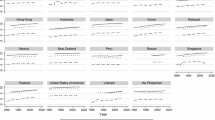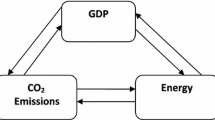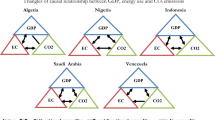Abstract
This study complements existing literature by examining the nexus between energy consumption (EC), CO2 emissions (CE), and economic growth (GDP; gross domestic product) in 24 African countries using a panel autoregressive distributed lag (ARDL) approach. The following findings are established. First, there is a long-run relationship between EC, CE, and GDP. Second, a long-term effect from CE to GDP and EC is apparent, with reciprocal paths. Third, the error correction mechanisms are consistently stable. However, in cases of disequilibrium, only EC can be significantly adjusted to its long-run relationship. Fourth, there is a long-run causality running from GDP and CE to EC. Fifth, we find causality running from either CE or both CE and EC to GDP, and inverse causal paths are observable. Causality from EC to GDP is not strong, which supports the conservative hypothesis. Sixth, the causal direction from EC to GDP remains unobservable in the short term. By contrast, the opposite path is observable. There are also no short-run causalities from GDP, or EC, or EC, and GDP to EC. Policy implications are discussed.
Similar content being viewed by others
Notes
The line of inquiry steers clear of Ackah and Kizys (2015) which is closest to this study in at least a threefold manner, notably in data, methodology, and interpretation of findings. First, we are using 24 African countries whereas the Ackah and Kizys have used 12 countries. Second, we are adopting an autoregressive distributed lag (ARDL) estimation approach whereas the underlying authors have used fixed-effects, random-effects and generalized method of moments (GMM). Third, on the interpretation of findings, our estimation technique enables us to provide both short- and long-term effects, which is not the case withc the inferences from the findings of Ackah and Kizys.
References
Ackah I, Kizys R (2015) Green growth in oil producing African countries: a panel data analysis of renewable energy demand. Renew Sustain Energy Rev 50(October):1157–1166
Akbostanci E, Turut-Asi S, Tunc GI (2009) The relationship between income and environment in Turkey: is there an environmental Kuznets curve? Energy Policy 37:861–867
Akinlo AE (2008) Energy consumption and economic growth: evidence from 11 sub-Sahara African countries. Energy Econ 30(5):2391–2400
Akinlo AE (2009) Electricity consumption and economic growth in Nigeria: evidence from cointegration and co-feature analysis. J Policy Model 31:681–693
Akinyemi O, Alege P, Osabuohien E, and Ogundipe A (2015) Energy security and the green growth agenda in Africa: exploring trade-offs and synergies, Department of Economics and Development Studies, Covenant University, Nigeria
Akpan US (2014) Impact of regional road infrastructure improvement on intra-regional trade in ECOWAS. Afr Dev Rev 26(S1):64–76
Akpan GE, Akpan UF (2012) Electricity consumption, carbon emissions and economic growth in Nigeria. Int J Energy Econ Policy 2(4):292–306
Ang JB (2007) CO2 emissions, energy consumption, and output in France. Energy Policy 35(10):4772–4778
Anyangwe E (2014) Without energy could Africa’s growth run out of steam? theguardian, http://www.theguardian.com/global-development-professionals-network/2014/nov/24/energy-infrastructure-clean-cookstoves-africa (Accessed: 08/09/2015)
Apergis N, Payne JE (2009) CO2 emissions, energy usage, and output in Central America. Energy Policy 37:3282–3286
Asongu SA (2014a) Correcting inflation with financial dynamic fundamentals: which adjustments matter in Africa? J Afr Bus 15(1):64–73
Asongu SA (2014b) Does money matter in Africa? New empirics on long- and short-run effects of monetary policy on output and prices. Indian Growth Dev Rev 7(2):142–180
Asongu SA and Kodila-Tedika O (2015) Is poverty in the African DNA (gene)?, African Governance and Development Institute Working Paper No. 15/011, Yaoundé
Asongu SA and Rangan G (2015) Trust and quality of growth, African Governance and Development Institute Working Paper No. 15/026, Yaoundé
Begum RA, Sohag K, Abdullah SMS, Jaafar M (2015) CO2 emissions, energy consumption, economic and population growth in Malaysia. Renew Sustainable Energy Rev 41(January):594–601
Belloumi M (2009) Energy consumption and GDP in Tunisia: cointegration and causality analysis. Energy Policy 37(7):2745–2753
Ben Jebli M, Ben Youssef S (2015) The environmental Kuznets curve, economic growth, renewable and non-renewable energy, and trade in Tunisia. Renew Sustain Energy Rev 47(July):173–185
Bildirici ME, Kayıkçı F (2012) Economic growth and electricity consumption in former Soviet Republics. Energy Econ 34(3):747–753
Binder M and Offermanns C (2007) International investment positions and exchange rate dynamics: a dynamic panel analysis. CFS Working Paper No. 2007/23, CESifo Working Paper
Bölük G, Mehmet M (2015) The renewable energy, growth and environmental Kuznets curve in Turkey: an ARDL approach. Renew Sustain Energy Rev 52(December):587–595
Boubaker S, Jouini J (2014) Linkages between emerging and developed equity markets: empirical evidence in the PMG framework. North Am JEcon Finance 29(July):322–335
Breitung J (2000) The local power of some unit root tests for panel data. In: Baltagi BH (ed) Advances in econometrics, volume 15: nonstationary panels, panel cointegration, and dynamic panels. JAY, Amsterdam, pp 161–178
Brooks C (2008) Introductory Econometrics for Finance. Cambridge University Press
Choi I (2001) Unit root tests for panel data. J Int Money Finan 20(2):249–272
Diao XD, Zeng SX, Tam CM, Tam VWY (2009) EKC analysis for studying economic growth and environmental quality: a case study in China. J Cleaner Prod 17:541–548
Esso LJ (2010) Threshold cointegration and causality relationship between energy use and growth in seven African countries. Energy Econ 32:1383–1391
Fosu AK (2015) Growth, inequality and poverty in sub-Saharan Africa: recent progress in a global context. Oxford Dev Stud 43(1):44–59
Hadri K (2000) Testing for stationarity in heterogeneous panel data. Econ J 3(2):148–161
He J, Richard P (2010) Environmental Kuznets curve for Co2 in Canada. Ecol Econ 69:1083–1093
Huxster JKX, Uribe-Zarain X, Kempton W (2015) Undergraduate understanding of climate change: the influences of college major and environmental group membership on survey knowledge scores. J Environ Educ 46(3):149–165
Im KS, Pesaran MH, Shin Y (2003) Testing for unit roots in heterogeneous panels. J Econ 115(1):53–74
Jumbe CB (2004) Cointegration and causality between electricity consumption and GDP: empirical evidence from Malawi. Energy Econ 26:61–68
Kifle T (2008) Africa hit hardest by global warming despite its low greenhouse gas emissions, Institute for World Economics and International Management Working Paper No. 108, http://www.iwim.uni-bremen.de/publikationen/pdf/b108.pdf (Accessed: 08/09/2015)
Levin A, Lin CF, Chu CSJ (2002) Unit root test in panel data: asymptotic and finite sample properties. J Econ 108(1):1–24
Mehrara M (2007) Energy consumption and economic growth: the case of oil exporting countries. Energy Policy 35:2939–2945
Menyah K, Wolde-Rufael Y (2010) Energy consumption, pollutant emissions and economic growth in South Africa. Energy Economics 32:1374–1382
Odhiambo NM (2009a) Electricity consumption and economic growth in South Africa: a trivariate causality test. Energy Econ 31(5):635–640
Odhiambo NM (2009b) Energy consumption and economic growth nexus in Tanzania: an ARDL bounds testing approach. Energy Policy 37(2):617–622
Olusegun OA (2008) Consumption and economic growth in Nigeria: a bounds testing cointegration approach. J Econ Theory 2(4):118–123
Ongolo S, Karsenty A (2011) La lutte contre la déforestation en Afrique centrale: victime de l'oubli du politique? Ecol Politique 42:71–80
Ozturk I (2010) A literature survey on energy-growth nexus. Energy Policy 38:340–349
Ozturk I, Acaravci A (2010) CO2 emissions, energy consumption and economic growth in Turkey. Renew Sustain Energy Rev 14:3220–3225
Ozturk I, Bilgili F (2015) Economic growth and biomass consumption nexus: dynamic panel analysis for sub-Sahara African countries. Appl Energy 137(1):110–116
Pedroni P (2004) Panel cointegration. Asymptotic and finite sample properties of pooled time series tests with an application to the PPP hypothesis. Econ Theory 20(3):597–625
Pesaran MH, Smith RP (2014) Signs of impact effects in time series regression models. Econ Lett 122(2):150–153
Pesaran MH, Shin Y, Smith RJ (1999) Pooled mean group estimation of dynamic heterogeneous panels. J Am Stat Assoc 94(446):621–634
Pesaran MH, Shin Y, Smith RJ (2001) Bound testing approaches to the analysis of level relationships. J Appl Econ 16(3):289–326
Raheem ID, Yusuf AH (2015) Energy consumption-economic growth nexus: evidence from linear and nonlinear models in selected African countries. Int J Energy Econ Policy 5(2):558–564
Shuaibu M (2015) Trade liberalization and intra-regional trade: a case of selected ECOWAS countries. Afr Dev Rev 27(1):27–40
Shurig S (2015) Who will fund the renewable solution to the energy crisis?, theguardian, http://www.theguardian.com/global-development-professionals-network/2014/jun/05/renewable-energy-electricty-africa-policy (Accessed: 08/09/2015)
Tiwari AK, Apergis N, Olayeni OR (2015) Renewable and nonrenewable energy production and economic growth in sub-Saharan Africa: a hidden cointegration analysis. Appl Econ 47(9):861–882
Tumwebaze HK, Ijjo AI (2015) Regional economic integration and economic growth in the COMESA region, 1980–2010. Af Dev Rev 27(1):67–77
Wolde-Rufael Y (2005) Energy demand and economic growth: the African experience. J Policy Model 27(8):891–903
Wolde-Rufael Y (2006) Electricity consumption and economic growth: a time series experience for 17 African countries. Energy Policy 34(10):1106–1114
Zhang M, Dai S, Song Y (2015) Decomposition analysis of energy-related CO2 emissions in South Africa. J Energy South Africa 26(1):67–73
Acknowledgments
The authors are highly indebted to the editor and referees for constructive comments.
Author information
Authors and Affiliations
Corresponding author
Additional information
Responsible editor: Philippe Garrigues
Rights and permissions
About this article
Cite this article
Asongu, S., El Montasser, G. & Toumi, H. Testing the relationships between energy consumption, CO2 emissions, and economic growth in 24 African countries: a panel ARDL approach. Environ Sci Pollut Res 23, 6563–6573 (2016). https://doi.org/10.1007/s11356-015-5883-7
Received:
Accepted:
Published:
Issue Date:
DOI: https://doi.org/10.1007/s11356-015-5883-7




